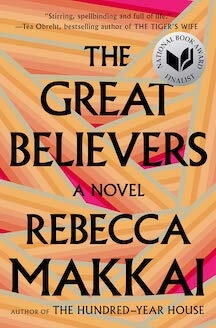What are you reading in May?

In our monthly book club, we discuss whatever we happen to be reading and ask everyone in the comments to do the same. What Are You Reading This Month?
Calm Sea And Prosperous Voyage by Bette Howland
Bette Howland’s stories lure you in. Their opening sentences are ordinary to the point of appearing unremarkable, lulling readers into a familiar comfort before delivering lines like “Happiness has become a novelty item” or “What better way to tell your mother what you think of her than not to have children?” Howland’s stories walk in the side door, take a look around, then pull you into the kitchen to tell you an uncomfortable secret. Many of the stories in Calm Sea And Prosperous Voyage, the author’s selected stories released this month by A Public Space, can feel mimetic, with insights arriving while characters ride the bus or sit behind a desk.
Howland was born in Chicago and lived in the city until she was nearly 40, and her writing reflects her origins both broadly and granularly, at once a city-wide view and a personal one. In “Blue In Chicago”—the title story of her 1978 collection, from which many of these stories come—she observes the city’s segregation, crime, and white flight from the point of view of a sympathetic white woman—someone who cares about the different people she observes, but for whom the stakes often aren’t as high. “Twenty-Sixth And California,” a phrase Chicagoans will recognize as shorthand for the Cook County jail, is a fly-on-the-wall account of a day in a busy courtroom. Peppered with babushka-wearing grandmas, passive-aggressive mothers, and uncles asking their adult nieces when they’re going to get married already, Howland’s stories also depict intergenerational tensions within families. As a native Midwesterner and long-time Chicagoan, I also found many of Howland’s turns of phrase uncannily familiar: An old woman puts on a spread “like nobody’s business”; a man has a worn patch of hair on his head where a rock “beaned” him; and a garbage can “stinks to high heaven.”
For all the city’s pride in claiming its own, Chicago often only does so after artists receive acclaim elsewhere. It took a New Yorker, A Public Space editor Brigid Hughes, finding an out-of-print copy of Howland’s 1974 memoir in a bookstore dollar bin to bring her work back into the literary conversation, now a year and a half after the author’s death. With publication of the memoir, W-3, to come, it remains to be seen just how much renewed attention Howland’s work will receive in her hometown and beyond. As the grumbling father in one story says, “‘A prophet is without honor in his own country.’” [Laura Adamczyk]
Alexander Hamilton by Ron Chernow
At this point, Conan O’Brien white whale Ron Chernow’s exhaustive biography of the life of America’s first treasury secretary may have been mildly eclipsed by the bona fide pop culture phenomenon it helped inspire. (Even if Lin-Manuel Miranda fudged plenty of the details of Hamilton’s life in the process of winning all those Tonys.) But while it’s short on catchy tunes, Chernow’s examination of the paradoxical life of Alexander Hamilton—slave-trading abolitionist, rebel authoritarian—remains a briskly paced, engagingly written trip through the earliest moments of America’s fractious and bloody history. And if Chernow occasionally tips his hand as a Hamilton fan—extending his subject an unearned benefit of the doubt on some of his less savory characteristics—it’s with an eye toward keeping its story moving and protagonist relatable, no easy task when you don’t have Broadway’s best to keep things rolling along. [William Hughes]
The Great Believers by Rebecca Makkai
I was immediately engrossed by Rebecca Makkai’s The Great Believers, a finalist for this year’s National Book Award in fiction. Makkai’s emotional novel travels back and forth between Chicago in the mid-’90s and present-day Paris. The flashback chapters explore the AIDS epidemic and how it affected a particular group of friends in the North Side neighborhood of Boystown, effectively coming of age in a plague. Makkai’s descriptions of both cities immerse the reader (she did considerable research in the archives of the local LGBTQ newspaper, Windy City Times), highlighting city hallmarks, from the lakefront paths to the annual Pride Parade. She fleshes out these friends so fully that we are as terrified as main character Yale when he goes to get his AIDS test, and devastated by the descriptions of formerly vibrant young men in varying stages of the disease that will eventually kill them. There’s still some hope to be found as the survivors reconvene years later, as The Great Believers finds strength in the solace of sentimental nostalgia, and the value of love whenever, wherever you can find it, even in the most difficult times imaginable. I honestly don’t know when I’ve ever been so sad to finish a book. Fortunately, Amy Poehler just optioned the rights to bring the novel to television, and I can’t wait to see what she does with it. [Gwen Ihnat]